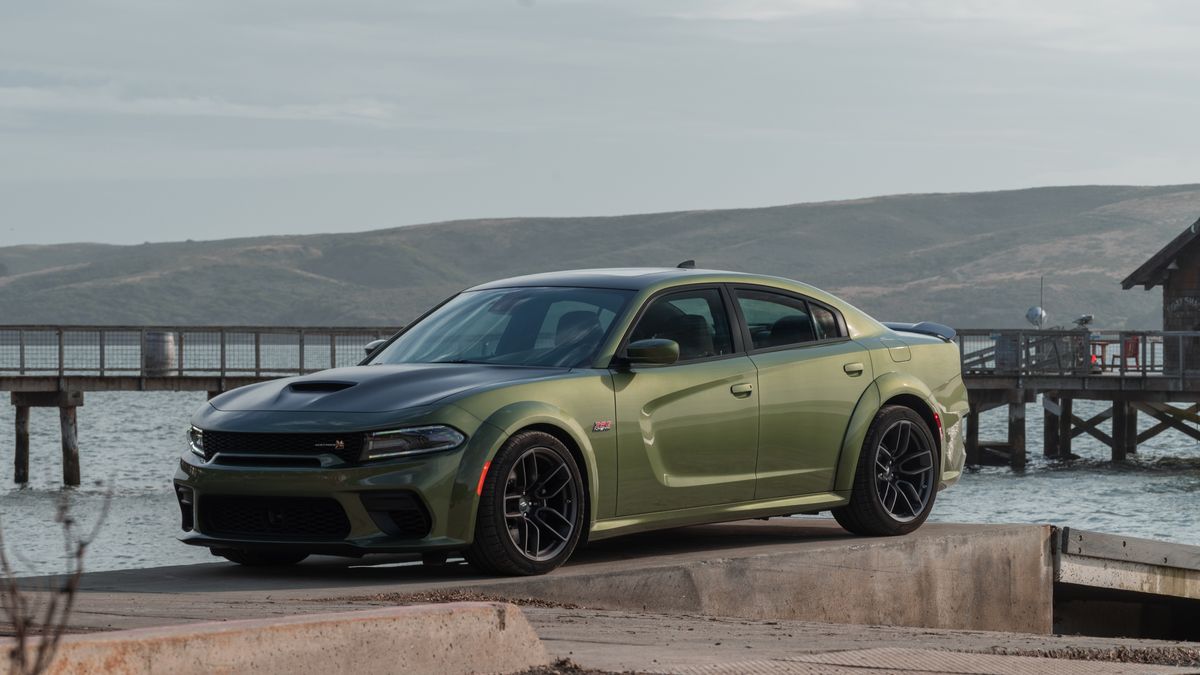The fine folks at Dodge Motor Company have issued a sizeable recall involving over 71 thousand examples of their ever-popular Charger and Chrysler 300 sedans built between the model years of 2007 through 2010. It seems the very airbags that aim to cushion occupants in the event of a collision within these vehicles can sadly no longer be fully trusted, as regulators have discovered the potential for a truly terrifying failure mode.
In a development that sent shockwaves through the automotive industry and shook passengers to their core, authorities revealed evidence that the airbags installed as original equipment by supplier Takata Corporation face an unacceptable risk of launching sharp projectile fragments directly at the driver and front seat passengers whenever deployed. The defective airbag inflators at the root of this issue were part of the largest automotive recall in modern history – a saga that shows no signs of concluding anytime soon based on its enormous scope and complicated nature.
Tragically, Takata’s faulty devices have already been definitively linked by officials to at least 27 lost lives around the world due to their tendency to explosively disintegrate. Nearly 300 reported injuries have also stemmed from the malfunctioning airbags to date. Though thankfully no fatalities have yet involved the now-recalled Dodge and Chrysler models, over 23 people are known to have been severely wounded from the dangerous deflating deployments. One can only imagine the potential fallout if this vulnerability is not addressed promptly and completely.
This latest notice considerably expands the Japanese auto parts manufacturer’s ongoing efforts to rectify a substantial portion of its defective driver-side airbag inflators. Previously in November 2020, Dodge had initiated a more limited recall targeting a smaller population of vehicles exhibiting the issue, but the replacement campaign will need to be taken to an even more extensive scale to potentially save lives.
Stellantis, the parent company of Dodge and Chrysler, has developed a strategy to proactively pump fresh, non-explosive gas generators into the impacted vehicles free of charge via dealers nationwide. Owners of qualifying cars will receive letters notifying them to schedule a repair appointment starting February 21st, wherein a factory-authorized technician can generously gift a new, safer airbag module at no cost.
However, due to the sheer volume of vehicles involved as well as potential restraints in the supply chain, there is no guarantee that all recalled drivers will gain access to replacement parts immediately. Some experts worry that without an accelerated timeline, lives may remain at risk until all defective driver-side inflators are removed from their respective vehicles as intended. Patience will surely be required from conscientious car owners during this large-scale lifesaving effort.

According to investigators’ findings, the defective airbag inflators utilize ammonium nitrate as an explosive propellant to rapidly fill the airbags in a collision. However, it was discovered this otherwise stable compound can degrade over time when exposed to high heat and humidity, transforming into a dangerously hyper-sensitive explosive similar to dynamite.
Under the worst possible scenario of an inflator rupture, the airbag’s protective cushioning meant to save lives instead transforms into an uncontrolled deadly shrapnel blast. High-velocity fragments of the rupture can pepper the driver and passengers like ammunition, endangering innocent people who believe they are securely strapped into a modern safety device. No person deserves to experience such a grizzly fate while rightfully expecting to be shielded in an accident.
For their roles in allegedly covering up the significant public safety risks associated with tens of millions of defective vehicles on the roads, Takata pleaded guilty to criminal wire fraud in 2017 and agreed to pay billions in financial penalties and restitution. However, no amount of money can repair or replace the lives irreparably damaged or destroyed by the silent assassins lurking hidden within unsuspecting vehicles. The Japanese company carries the unenviable title of one of the largest automotive safety scandals in history.
In total, a staggering sixty-seven million cars from nineteen brands on six different continents have required comprehensive airbag system overhauls thanks to Takata’s fatally flawed products. No automaker was left untainted, showing that maintaining impeccable quality control reaches far beyond a single company’s watch and into the intricate network of globalized lifesaving automotive components manufacturing.
For the Chrysler brands, this new recall action serves as an important reminder that while Jeeps and some other nameplates have thankfully avoided inclusion, constant vigilance is needed as investigations persist. Other makes and models may yet be drawn into the expanding sphere of recalled Takata airbags if even the slightest hint of potential endangerment emerges. Passengers must demand transparency from all entities responsible for our on-road security.
Until repaired, drivers of the affected Dodge Chargers and Chrysler 300s face an agonizing waiting game to receive replacement driver airbag modules. With a limited initial stock of fresh components and high demand across millions of vehicles, prioritized handling of open recall cases will prove an intricate logistical challenge. Owners can only hope their vehicles achieve a fixed state before the potential tragedy.
Furthermore, individuals who have sold or traded one of the vehicles in question bear the ethical responsibility of promptly notifying subsequent owners or drivers about the unresolved—and still dangerous—recall notice. A single delayed communication could end up costing someone’s life due to placid unawareness of a known and preventable risk. All involved parties must pull together cooperatively for the greater good of public safety.
For answers to any lingering questions, the customer support divisions at both Stellantis and NHTSA welcome concerned calls. As the overseer of automotive recalls, the U.S. National Highway Traffic Safety Administration vows to closely monitor progress to ensure automakers resolve open issues comprehensively and without unacceptable delay. Our roads should be a place to arrive—not meet harm—each time a vehicle is started.
Completing this driver airbag recall with meticulous thoroughness across one hundred percent of affected Dodge and Chrysler products stands as a moral imperative. Regulators passionately encourage getting replacement inflators installed immediately upon being contacted so that victims of the past need not be victims of an unforgivable future through procedural errors or a lack of sense of urgency. Each day the problem persists untamed is a risk too far.
While Takata works to piece back together a reputation in tatters and Stellantis acts responsibly to solve lingering remnants, questions linger as to what other unexpected inflator issues may yet emerge. This file remains an engrossing human drama that shows no signs of a tidy conclusion. Have all potential harm points truly seen sufficient scrutiny, or could new problem inflators exist silently waiting to shock in unknown vehicles? Only time and continued investigation will provide clarity.
For the driving public, staying alert and proactively checking personal vehicles against all open inflator recalls grows increasingly important. These devices remain hidden out of sight but contain the potential for instant tragedy. By catching issues early and demanding accountability from all stakeholders, hopefully, no more need to lose life, livelihood, or security due to easily preventable manufacturing or compliance failures. Our well-being on public roads deserves top-tier protection.
With any fortune, through cooperation and communication, this recall can mark a major turning point – the cleanest, most comprehensive correction of the airbag catastrophe thus far. If stakeholders demonstrate exemplary commitment to rectifying every last remnant, perhaps victims can find solace, and a long-suffering public can feel assured in the safety of their vehicles once more. Progress against such a wide-reaching issue will prove an ongoing test, with human lives serving as the ultimate metric.
If stakeholders approach this final push with sufficient care, candor, and coordinated effort, one day we might reflect on this black chapter as an ultimately preventable wrong that spurred immense positive change. By learning from mistakes and strengthening safeguards, autonomous technologies, and crash prevention measures could one day render such large-scale product failures but a relic of ages past. Our children and grandchildren deserve nothing less.
In conclusion, many defective airbag inflators belonging to Takata finally disappeared for good, allowing citizens to travel freely without fear of injury from components meant to protect. Continued vigilance, accountability, and choice architecture upholding human life as the top priority can guide us toward that day. Our well-being, security, and peace of mind while commuting deserve no alternative.
As investigators deepen their forensic dive into the root causes behind Takata’s defective inflators, more unsettling insights continue emerging. Recent documents uncovered show Takata rushed experimental products to market and misled regulators regarding crucial safety testing processes. If proven accurate, such revelations paint an even bleaker picture of recklessness prioritizing profits over people.
Emails obtained through public records requests indicate Takata executives pressured engineers to falsify test results on explosive propellant performance under heat and humidity. When prototypes exhibited instability and leak issues, reports were allegedly altered and regulators were kept in the dark regarding the full scope of problems known internally. Such deception meant millions drove for years with an invisible ticking time bomb strapped to their steering wheel.
Perhaps most chilling of all, some evidence suggests Takata became aware of inflator issues as early as 2001. One employee raised safety concerns a full decade before a recall was initiated. If confirmed, it would show over 15 years of excuses, coverups, and denials that cost innocent lives – betraying a callous disregard for human life rarely seen in the corporate world. The human toll becomes even more senseless.
Now former employees have begun speaking out, providing a glimpse into the troubling culture that valued profits over principles. Extensive cost-cutting drastically reduced quality control procedures and expedited new product rollouts prematurely. Workers felt pressured into not reporting defects, despite privately worrying about the real-world impacts. A full ethical meltdown had been hidden from view.
In the court of public opinion, Takata’s reputation lies in tatters. But legal troubles are far from over – the U.S. Attorney is now pursuing criminal charges for allegedly providing misleading factual information. If convicted, it could remove those responsible from ever working in the auto industry again. Some experts say even stiffer penalties are needed to truly reform corporate malfeasance endangering lives.
When entrusted with products holding human life in the balance, businesses must uphold a sacred duty of care. Any failures should be fully acknowledged, and all responsible parties held strictly accountable to the highest ethical standards. If the allegations prove accurate, this seems a clear-cut case deserving strong deterrents to prevent similar tragedies down the line. The victims deserve righteous justice.
For now, the difficult work of sifting through this shameful mess continues. Replacement part shipments ramp up domestically and internationally to finally solve this pressing public health matter. Regulators vow thorough oversight to repair ruptured consumer faith in auto safety systems. Survivors seek long-denied solace and accountability through their ongoing legal fights.
This saga serves as an uneasy reminder of human fallibility, even among global corporate giants. When profit motives overpower integrity and oversight falls short, it reveals our societal vulnerability. Perhaps this chapter may also drive safer innovation if its unforgivable lessons genuinely reform how risks are mitigated and people are valued over balance sheets.
If the dusty archives of history one day retell the Takata airbag disaster, may it stand as the nadir – a dark hour that lit the path to a future where no product is too complex to scrutinize, no defect too small to address, and no amount of money carries higher worth than a single human life. Our work is just beginning to build the safer world victims and their loved ones deserved long ago.
For now, frontline efforts press ahead with renewed purpose. May each replacement part installed restore not only automotive safety but confidence in the systems ostensibly protecting society each day. And may the charges and reform continue until justice is fully and fairly served – so no other company ever dares tread similar unethical ground again, and no more families need to know such pain. This fight goes on.


























